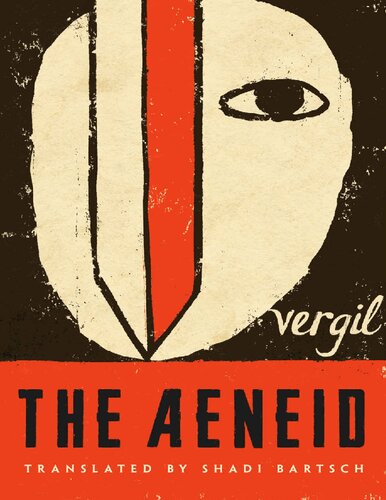
The Aeneid
کتاب های مرتبط
- اطلاعات
- نقد و بررسی
- دیدگاه کاربران
نقد و بررسی

Starred review from September 18, 2006
Princeton scholar Fagles follows up his celebrated Iliad
and Odyssey
with a new, fast-moving, readable rendition of the national epic of ancient Rome. Virgil's long-renowned narrative follows the Trojan warrior Aeneas as he carries his family from his besieged, fallen home, stops in Carthage for a doomed love affair, visits the underworld and founds in Italy, through difficult combat, the settlements that will become, first the Roman republic, and then the empire Virgil knew. Recent translators (such as Allen Mandelbaum) put Virgil's meters into English blank verse. Fagles chooses to forgo meter entirely, which lets him stay literal when he wishes, and grow eloquent when he wants: "Aeneas flies ahead, spurring his dark ranks on and storming/ over the open fields like a cloudburst wiping out the sun." A substantial preface from the eminent classicist Bernard Knox discusses Virgil's place in history, while Fagles himself appends a postscript and notes. Scholars still debate whether Virgil supported or critiqued the empire's expansion; Aeneas' story might prompt new reflection now, when Americans are already thinking about international conflict and the unexpected costs of war.

August 1, 2020
Blending solid scholarship with poetic sensibility, classicist Bartsch delivers a new version of the foundational poem of Imperial Rome. Why a new Aeneid? Because every decade or so a new version of a literary classic should appear, sometimes displacing an older one. And why the Aeneid at all? Writes University of Chicago classicist Bartsch in a long, circumstantial introduction, the poem raises endless intellectual problems. Is it "pro-Augustan," a celebration of Octavian, who would become Augustus Caesar? Was it a subtle paean to the fallen Republic? Why did Vergil ask that the poem be burned as he lay on his deathbed? Such questions keep people pondering the great poem. Writes Bartsch, at least the origins of the poem seem evident: Vergil "died in 19 BCE, not knowing how the Augustan era would turn out. It was definitely safer--at least for his posthumous reputation--to write about Octavian's ancestor, Aeneas." Bartsch notes that the poem is in all events a celebration of empire that joins the peoples of ancient Troy to those of ancient Italy to form a new world power (one that would crush its rival Carthage, with ties to Troy all its own). As for the poem itself, Bartsch delivers a translation that gives some sense of the Latin and the tautness of its lines; most other English versions are fully 30% or more longer than the original, but not hers. The very opening suggests her poetic values: Vergil sings not of "arms and the man" (arma virumque) but "war and a man," and the next verses have a Beowulf-like alliterative quality: "Remember for me, Muse. Tell me the reasons. What pain, / what insult to her power, moved the queen of gods / to drive a man famous for piety through misery / on misery? Can such anger grip gods' minds?" Through seductions, treacheries, murders, deicides, and other episodes, Bartsch--her scholarly notes as vigorous as her verse--produces an excellent companion for students of the poem and of Roman history. A robust, readable, reliable translation of a hallmark of world literature.
COPYRIGHT(2020) Kirkus Reviews, ALL RIGHTS RESERVED.

























دیدگاه کاربران